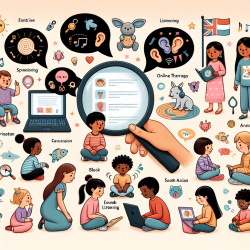Understanding the Connection Between Central Auditory Processing and Cognitive Functions in Children
In the realm of speech-language pathology, understanding the intricate relationship between central auditory processing (CAP) and cognitive functions in children is pivotal. The recent study titled "Central Auditory Processing and Cognitive Functions in Children" offers valuable insights that can transform therapeutic approaches and improve outcomes for children.
Key Findings from the Research
The study investigated 58 schoolchildren aged between 8 and 11 years, utilizing a range of tests to assess auditory abilities and cognitive functions. The results revealed significant correlations between auditory skills such as temporal resolution, binaural integration, and cognitive functions including executive functions, working memory, and cognitive flexibility.
- Temporal Resolution: This auditory ability showed significant correlations with executive functions, suggesting that children with better temporal resolution also exhibited stronger inhibitory control and planning skills.
- Binaural Integration: Associated with intelligence and sustained auditory attention, highlighting the complex interplay between auditory processing and cognitive capabilities.
- Unexpected Findings: A positive correlation was found between binaural interaction and emotional control, suggesting that auditory processing may influence emotional regulation.
Implications for Practitioners
These findings underscore the necessity of a multidisciplinary approach when diagnosing and treating central auditory processing disorders (CAPD). By integrating assessments of cognitive functions such as attention, memory, and executive functions, practitioners can achieve a more comprehensive understanding of a child's challenges and tailor interventions accordingly.
For practitioners at TinyEYE, this research reinforces the importance of incorporating cognitive assessments into therapy plans. By doing so, therapists can better identify comorbidities and optimize therapeutic strategies to enhance both auditory and cognitive outcomes for children.
Encouraging Further Research
While this study provides significant insights, it also highlights the need for further research. Larger sample sizes and diverse cognitive assessment tools could deepen our understanding of the CAP-cognitive function relationship. Practitioners are encouraged to engage in ongoing research and contribute to this evolving field.
To read the original research paper, please follow this link: Central Auditory Processing and Cognitive Functions in Children.










